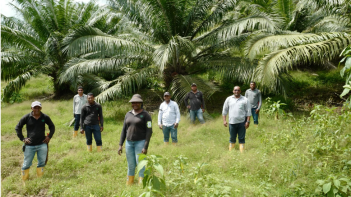Consumer demand for RSPO Certified Sustainable Palm Oil is on the rise
Kuala Lumpur, 20 October 2011 – McDonald’s Corp. has officially been approved as a member of the Roundtable on Sustainable Palm Oil (RSPO) following its announcement earlier this year on its commitment to source food from certified sustainable sources.
Only recently, three other US headquartered global companies, retailer Walmart, confectionery producer The Hershey Company and financial services leader Citigroup became members of the RSPO, joining the organization’s 700 member organizations from 50 countries around the globe. Currently, the United States (US) holds the 7th largest membership base in the RSPO, represented by a broad spectrum of industries from consumer goods and cosmetics manufacturers to processors and traders, the financial sector, retailers, and non-governmental organizations.
Darrel Webber, RSPO’s Secretary General, discusses this trend: “RSPO is a multi-stakeholder initiative that promotes the production and use of certified sustainable palm oil. The RSPO’s increasing membership within the consumer and retail sectors denotes their commitment towards sustainable palm oil. It is an affirmative development on the demand side to complement the production and supply of sustainable palm oil. RSPO’s vision to transform the market and make sustainable palm oil the norm can only be achieved with the active participation of all parties involved in the supply chain, from growers to traders, manufacturers and retailers.
Thanks to companies like McDonald’s, end consumers will become increasingly aware of the importance of sourcing sustainable palm oil responsibly through ethical purchasing decisions. In the larger context, the consumption of sustainable palm oil will benefit communities and the environment in producer countries around the world. Ultimately, the RSPO aspires to facilitate the link between responsible growers to responsible consumers committed to the use of sustainable palm oil.”
Francesca DeBiase, McDonald’s vice president for Worldwide Strategic Sourcing, commented that: “McDonald’s is committed to the sustainable sourcing of our raw materials, and participating in multi-stakeholder engagements such as the RSPO is one way for us to lend further support towards sustainable palm oil and put the power and leadership of our brand behind the RSPO and their commitment to ensuring sustainable palm oil.”
To encourage this process, on 1 June 2011, RSPO released its new trademark which RSPO members can use for product communication. From now on, producers of household products such as margarine, cookies, chocolate, soap and cosmetics will be able to illustrate their commitment to sustainable palm oil through the use of the RSPO trademark. This will enable consumers to fully participate in contributing to a sustainable future by selecting products that display the RSPO trademark, and thus contain palm oil derivatives that are produced and sourced according to RSPO’s standards.
McDonald’s commitment to sustainable palm oil is part of the company’s Sustainable Land Management Commitment (SLMC). This is the result of an internal analysis to determine which of its most purchased raw materials have the greatest environmental and sustainability impact. The analysis was carried out with the support of WWF, a founding member of RSPO. Palm oil was identified as one of the five initial priorities of the Sustainable Land Management Commitment.
McDonald’s uses palm oil primarily within Asia-Pacific, the Middle East and Africa, and Latin America, as a restaurant frying oil and as a par-fry for the pre-cooking of products such as French fries, chicken sandwiches and Chicken McNuggets.
About RSPO
In response to the urgent and pressing global call for sustainably produced palm oil, the Roundtable on Sustainable Palm Oil (RSPO) was formed in 2004 with the objective of promoting the growth and use of sustainable oil palm products through credible global standards and engagement of stakeholders. The seat of the association is in Zurich, Switzerland, while the secretariat is currently based in Kuala Lumpur with a satellite office in Jakarta.
RSPO is a not-for-profit association that unites stakeholders from seven sectors of the palm oil industry – oil palm producers, palm oil processors or traders, consumer goods manufacturers, retailers, banks and investors, environmental or nature conservation NGOs and social or developmental NGOs – to develop and implement global standards for sustainable palm oil.
Such multi-stakeholder representation is mirrored in the governance structure of RSPO such that seats in the Executive Board and project level Working Groups are fairly allocated to each sector. In this way, RSPO lives out the philosophy of the "roundtable" by giving equal rights to each stakeholder group to bring group-specific agendas to the roundtable, facilitating traditionally adversarial stakeholders and business competitors to work together towards a common objective and making decisions by consensus.
— End —
For further information, kindly contact:
|
Contact for RSPO Secretariat: Anne Gabriel, Communications Director T:+603-22012053 |
Contact for Europe: Hill & Knowlton, Tanno Massar T: +32 (0)2 231 50 19 |
Contact for Indonesia: Desi Kusumadewi RSPO Indonesia Director T: +62 21 5794 0222
|
|||
|
Contact for India: T: +91-124-4967316
A SNAPSHOT OF KEY FACTS:
|
|
|
|
Total volume of Certified Sustainable Palm Oil to date: |
5,191,340 metric tonnes |
|
Total volume of Certified Sustainable Palm Kernel to date: |
1,210,302 metric tonnes |
|
Total production area of CSPO: |
1,023,435 ha |
|
Number of grower companies certified: |
28 |
|
Number of mills certified: |
123 |
|
Number of supply chains certified: |
114 |
|
Number of supply chain facilities certified: |
226 |
|
Year on year CSPO Uptake: |
2008 (certification began): 2.7% 2009: 25.3% 2010: 46.2% |
|
% of CSPO of global Crude Palm Oil |
Over 10% |
|
CSPO producer markets in the world: |
Malaysia; 48% Indonesia: 40% Rest of the world (Papua New Guinea; Solomon Island; Brazil; Columbia): 12% |
|
Total number of members: |
Total: 685 members Ordinary Members: 520 members Affiliate Members: 96 members Supply Chain Associates 69 members |
|
Top 5 largest membership by country: |
Malaysia: 18.6% United Kingdom: 16.9% Indonesia: 15.9% Netherlands: 10% Germany: 10% |
|
Top 3 largest membership by stakeholder group: |
Processors & Traders: 37.5% Consumer Goods Manufacturers: 32.1% Growers: 17.5% |
Keep reading

Access into prisma

Updated Trace Function in prisma

Call for Expression of Interest: Independent Investigation of a Complaint

Latin American Smallholders, Key Global Brands Gather in Peruvian Amazon to Advance Sustainable Palm Oil

RSPO Forum for Members and Certification Bodies 2025: Strengthening Capacities and Building Bridges with RSPO Members

From Violence to Prosperity: Cultivating Sustainable Palm Oil in San Pablo, Colombia

Palmas de Tumaco: Enduring, Trusting, and Transforming in Colombia’s Pacific Coast
Carry Over Credits for Certified Independent Smallholder Groups




